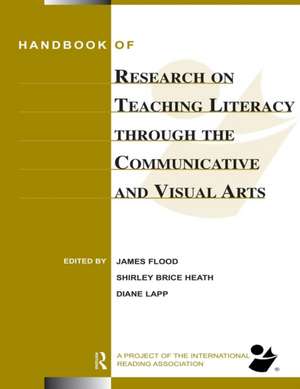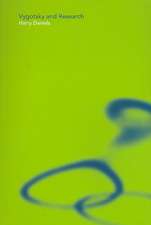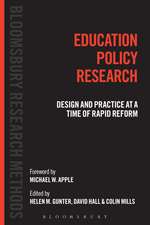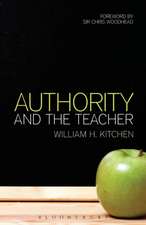Handbook of Research on Teaching Literacy Through the Communicative and Visual Arts: Sponsored by the International Reading Association
Autor James Flood, Diane Lapp, Shirley Brice Heathen Limba Engleză Paperback – 30 aug 2004
Preț: 847.15 lei
Preț vechi: 1033.12 lei
-18% Nou
Puncte Express: 1271
Preț estimativ în valută:
162.10€ • 169.68$ • 134.92£
162.10€ • 169.68$ • 134.92£
Carte tipărită la comandă
Livrare economică 01-15 aprilie
Preluare comenzi: 021 569.72.76
Specificații
ISBN-13: 9780805853797
ISBN-10: 0805853790
Pagini: 936
Dimensiuni: 210 x 280 x 57 mm
Greutate: 2.31 kg
Ediția:New.
Editura: Taylor & Francis
Colecția Routledge
Locul publicării:Oxford, United Kingdom
ISBN-10: 0805853790
Pagini: 936
Dimensiuni: 210 x 280 x 57 mm
Greutate: 2.31 kg
Ediția:New.
Editura: Taylor & Francis
Colecția Routledge
Locul publicării:Oxford, United Kingdom
Public țintă
ProfessionalCuprins
Contents: Preface. Part I: Theoretical Bases for Communicative and Visual Arts Teaching. P. Messaris, Introduction. R. Hobbs, Literacy for the Information Age. S.B. Neuman, Television as a Learning Environment: A Theory of Synergy. R. Desmond, TV Viewing, Reading, and Media Literacy. M. Willmorth, Television and Language Learning. M. Griffin, D. Schwartz, L. Labbo, Visual Communication Skills and Media Literacy. P. Messaris, Visual Intelligence and Analogical Thinking. G. Page, Visual Intelligence and Spatial Aptitudes. J. Carey, Exploring Future Media. J.L. Wolf, Balancing Act: Using Drama to Even the Exchange of Information in the Classroom. D. Reinking, M. McKenna, Navigating the Changing Landscape of Literacy: Current Theory and Research in Computer-Based Reading and Writing. Part II: Methods of Inquiry in Communicative and Visual Arts Teaching. D.E. Alvermann, Introduction: Explorations in Crossing Boundaries. S.Z. Athanases, Ethnography for the Study of Performance in the Classroom. C.D. Baker, Transcription and Representation in Literacy Research. J.F. Baumann, B.S. Bisplinghoff, J.B. Allen, Methodology in Teacher Research: Three Cases. R. Calfee, Assessing Development and Learning Over Time. A.H. Dyson, Children Out of Bounds: The Power of Case Studies in Expanding Visions of Literacy Development. J. Green, D. Bloome, Ethnography and Ethnographers of and in Education: A Situated Perspective. L. Neilsen, Remaking Sense, Reshaping Inquiry: Feminist Metaphors and a Literacy of the Possible. C.C. Pappas, Making 'Collaboration' Problematic in Collaborative School-University Research: Studying With Urban Teacher Researchers to Transform Literacy Curriculum Genres. L. Richardson, Poetic Representation. C.S. Stavropoulos, Alternative Methodology for Diagnostic Assessment of Written and Verbal Responses to Works of Art. A.P. Sweet, A National Policy Perspective on Research Intersections Between Literacy and the Visual/Communicative Arts. R.J. Tierney, Learning With Multiple Symbol Systems: Possibilities, Realities, Paradigm Shifts and Developmental Considerations. Part III: Research on Language Learners in Families, Communities, and Classrooms. V. Chou, Introduction. M. Krechevsky, U.C. Malkus, Telling Their Stories, Singing Their Songs. C.L. Ramsey, Deaf Children as Literacy Learners: Tom, Robbie, and Paul. C. Daiute, Youth Genre in the Classroom: Can Children's and Teachers' Cultures Meet? C.D. Lee, Bridging Home and School Literacies: Models for Culturally Responsive Teaching, a Case for African-American English. E. Binstock, Studen Conversations: Provocative Echoes. D. Conquergood, Street Literacy. V.L. Gadsden, Intergenerational Discourses: Life Texts of African-American Mothers and Daughters. G. Pharness, L. Weinstein, Community Literacy: From Home to Work and Back. H. Adams, A Grass Roots Think tank: Linking Writing and Community Building. Part IV: Research on Language Teachers: Conditions and Contexts. D.S. Strickland, Introduction. P.L. Grossman, S.W. Valencia, F.L. Hamel, Preparing Language Arts Teachers in a Time of Reform. J.L. Olson, Becoming a Member of a Professional Language Learning Community. J.V. Tinajero, A. Huerta-Macias, Teacher Preparation in the Language Arts: A Synthesis. D. Bayles, N. Roser, Exploring Voices of the Language Arts Universe: From Tin Can Telephones to Satellite Missions. R.T. Vacca, J.A.L. Vacca, B. Bruneau, Teachers Reflecting on Practice. R.P. Mesa, Putting It in Perspective: Administrating Art Education for Literacy. A.I. Willis, V.J. Harris, Preparing Preservice Teachers to Teach Multicultural Literature. Part V: Expanding Instructional Environments: Teaching, Learning, and Assessing the Communicative and Visual Arts. N. Roser, Introduction. L.M. Morrow, D.H. Tracey, Instructional Environments for Language and Learning: Considerations for Young Children. A.D. Pellegrini, Dramatic Play, Context, and Children's Communicative Behavior. S. Wolf, B. Edmiston, P. Enciso, Drama Worlds: Places of the Heart, Head, Voice, and Hand in Dramatic Interpretation. M.C. Scala, V.C. Schroder, From Storytelling to Getting On-Line: Language and Literacy Opportunities in the Elementary School. G. Wells, G.L. Chang-Wells, "What Have You Learned?": Co-constructing the Meaning of Time. R.L. Venezky, The Literary Text: Its Future in the Classroom. T.G. Sticht, Instructional Environments for Language and Literacy: Considerations for the Adult Learner. L. Baines, Film, Video, and Books: Some Considerations for Learning and Teaching. W.M. Butler, Electronic Discourse Communities: Theory, Practice, and Research. J.M. Shiring, The Future of Television in the Home and in the Classroom: Evidence for Impact. K.D. Wood, J. Nicholson, Newspapers and On-Line Text: Essentials of the Literacy Environment. S.B. Heath, V. Bhagat, Reading Comics, the Invisible Art. R. Farr, E. Jongsma, Accountability Through Assessment and Instruction. Part VI: Research Perspectives on Curricular, Extracurricular, and Policy Perspectives. J.R. Squire, Introduction. R.E. Shafer, Who Determines Policy, Power, and Politics and What Are Their Attitudes? L.C. Wilkinson, E.R. Silliman, Alternative Assessment, Literacy Education, and School Reform. C.J. Hydrick, Setting Opportunity-to-Learn Standards. S. O'Neal, S. Strecker, State Curricular Frame-Works and Standards in the Communicative Arts. G.S. Pinnell, Reading Recovery: A Summary of Research. M.M. Clay, International Pespectives on the Reading Recovery Program. J.R. Paratore, R. Indrisano, Change Through Collaboration: The Boston University-Chelsea Public Schools Partnership in Literacy. I.W. Gaskins, Teaching the Delayed Reader: The Benchmark School Model. K.H. Au, C.L. Asam, Effective Literacy Instruction: Findings of the Kamehameha Elementary Education Program. P.C. Gonzales, M. Grubb, California's Literature-Based Curriculum and the California Literature Project. J. Richmond, The Introduction of the National Curriculum for English. W. Elley, Cross-National Studies of Literacy. R.L. Allington, S. Guice, Literature Curriculum: Issues of Definition and Control. S.W. Freedman, L. Flower, G. Hull, J.R. Hayes, Ten Years of Research: Achievements of the National Center for the Study of Writing and Literacy. J.T. Guthrie, M. McCann, C. Hynd, S. Stahl, Classroom Contexts Promoting Literacy Engagement. P.D. Pearson, Standards in the Language Arts. K.K. Wixson, C.W. Peters, S.A. Potter, Developing State Standards in English Language Arts: A Case Study. Part VII: Voices From the Field. L. Galda, B.E. Cullinan, Introduction. A. Alejandro, Like Happy Dreams: Integrating Visual Arts, Writing, and Reading. M.C. Clark, Symbolism: A Third-Grade Experience. R.M. Kerper, Voices From the Field: Constructing Meaning From Illustrations. M.R. Strickland, We Are the Music Makers: Helping Children Express Themselves Through the Magic of Poetry. J. Yolen, The Eye and the Ear. J. Greenberg, Books About Art: A Joyous Vision. K. Paterson, Sound and Resound. W. Nikola-Lisa, An Author Celebrates the Unpredictable Ways of the Illustrator. B. Kiefer, The Visual Arts Made Accessible Through Picture Books. S. Tozer, V. Chou, Playing Against Conventions: The True Story of the Stinky Cheese Man. M. Brown, Reflections: Arthur Moves to TV and CDs. K
Notă biografică
James, Flood, Brice Shirley Heath, Diane, Lapp
Descriere
In an era characterized by the rapid evolution of the concept of literacy, this handbook focuses on multiple ways in which learners gain access to knowledge and skills. It explores the possibilities of broadening current conceptualizations of literacy to include the full array of the communicative arts.










